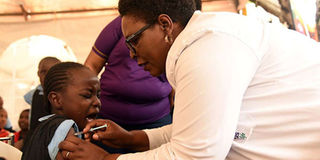Women, children at most risk; let’s act

Beyond Zero holds a human papillomavirus vaccination drive at Uhuru Park in Nairobi on January 23, 2020. PHOTO | FILE | NATION MEDIA GROUP
What you need to know:
- We must urgently protect the most vulnerable and disadvantaged and address the root of inequality or be ashamed by the number of lives lost on our watch.
- We need to put our money into solutions that focus on partnership. Let stakeholders work together: civil society, business, health professionals, donors and citizens.
Wherever Covid-19 strikes, it magnifies unfairness and inequality: hard-won progress for women, newborns and young people is being reversed.
This is not the work of the disease but our reaction to it: resources for essential healthcare shrink, people fear using health services and poverty and hunger grow.
That is compounded by fragile health systems and lack of preparation. A Lancet study shows these could kill over a million children and thousands of mothers in low- and middle-income countries in six months.
In the past 20 years, keeping mothers and children alive has been one of the greatest public health success stories. Child death rates have almost halved, and maternal death rates are down by over a third. Those gains are now being eroded as inequalities spread.
We can have a better future, guided by experience. In past pandemics, women — along with children, adolescents and the most vulnerable — often haven’t received their fair share of resources and services.
They’ve been excluded from decision-making: 70 per cent of health workers are female yet women’s basic needs have often gone unmet and their voices unheard. Resources to deal with the pandemic are often diverted.
EXTREME POVERTY
These “secondary effects” often dwarf a virus’s direct impact. For example, more than 3,500 people died of Ebola during the 2014-15 outbreak in Sierra Leone — including 3,600 mothers and babies due to disruption to essential health services.
The Guttmacher Institute warns that Covid-19 could have a catastrophic effect on sexual and reproductive health in poorer countries.
Even a 10 per cent reduction in care could kill 168,000 babies and 28,000 mothers and lead to three million unsafe abortions.
Many children will suffer the lifelong effects of not being immunised against other serious diseases as parents shun health facilities for fear of contagion, curfews or lack of transport.
The UN estimates 42-66 million children will fall into extreme poverty this year due to the economic impact.
Covid-19 is not the great leveller but rather the great amplifier of inequality. We must urgently protect the most vulnerable and disadvantaged and address the root of inequality or be ashamed by the number of lives lost on our watch.
We, the authors of this article, come from four continents but speak with one voice on what we — as a global community — must do differently this time.
EXPAND HEALTH SECTOR
One, we need national policies and budgets to protect human rights and promote inclusivity, equity and fairness — during this pandemic and in its aftermath. That includes strategies for preventing gender-based violence, child abuse and the mistreatment of health workers.
Two, we need to focus on strengthening health systems, including immunisation and basic primary healthcare, to ensure universal health coverage.
We need to expand health infrastructure to rural and underserved areas, and gradually expand universal health coverage.
Women and families, especially in disadvantaged communities, need support to keep using essential health services, including those for sexual and reproductive health.
Three, we need to put our money into solutions that focus on partnership. Let stakeholders work together: civil society, business, health professionals, donors and citizens.
We call for multistakeholder partnerships that involve women, children and adolescents in decisions that profoundly affect their health and well-being.
That’s why we support the Access to Covid-19 Tools (ACT) Accelerator — an unprecedented commitment by global leaders to work together, to develop and manufacture vaccines, tests and treatments for the disease, and to make them available and affordable for everyone everywhere.
It was launched by the WHO on April 24, and an EU-led fundraising initiative met its initial target of €7.5 billion in just two days.
EFFECTIVE COOPERATION
Coming after an open letter to G20 governments by 214 world leaders, economists and health experts, it called for urgent coordinated global leadership and solidarity.
As the letter says, if Covid-19 remains in any country, it will re-emerge and prolong this economic and health crisis.
And we have the tools for effective cooperation on global problems: a whole-of-government approach, involving multi-stakeholder partnerships. They’ve been sharpened in our work on the Sustainable Development Goals. Let’s use them now.
We are seeing people and nations working together in peacetime in a way only achieved in war.
Our response may set a precedent for tackling long-standing issues like poverty, gender inequality and climate change. Let’s prove we can work together to overcome unfairness and inequality for the good of all.
Ms Kersti Kaljulaid is the president of Estonia; Ms Helen Clark, former prime minister of New Zealand, is the PMNCH board chair; Dr Jorge Varela is the secretary of health of Mexico; and Ms Graça Machel, the founder of the Graça Machel Trust, is a former PMNCH board chair. (This article was first published by Thomson Reuters Foundation.)


